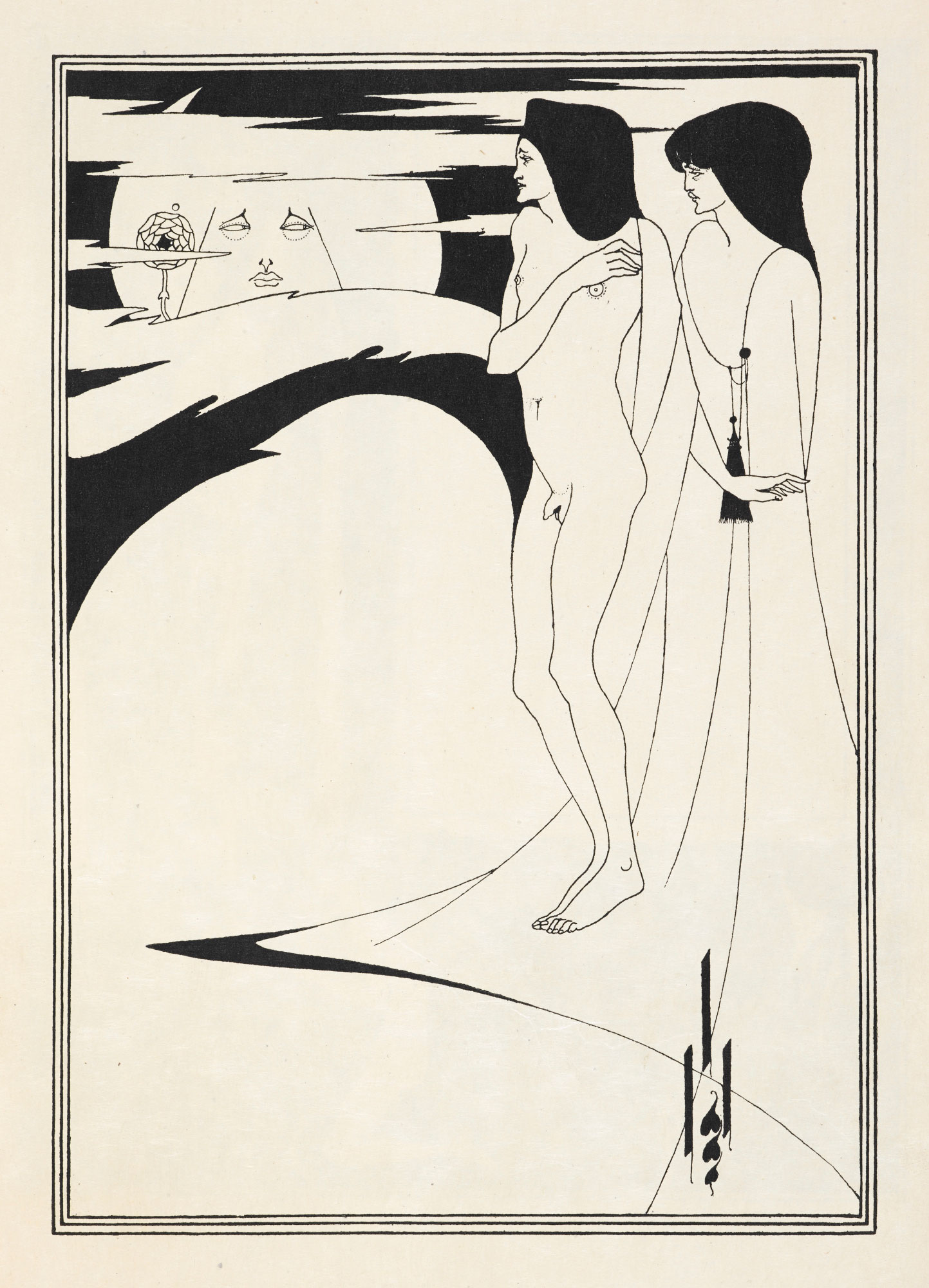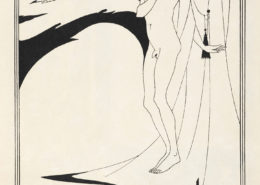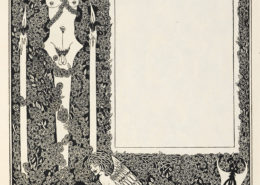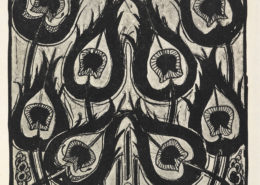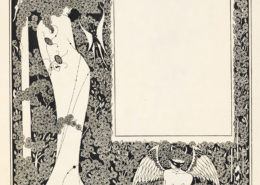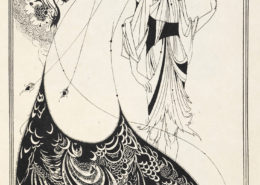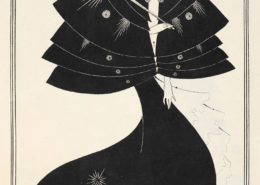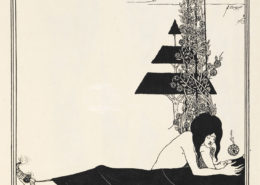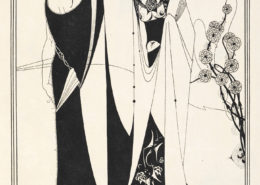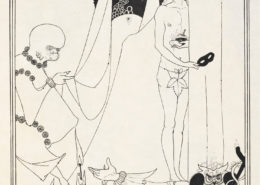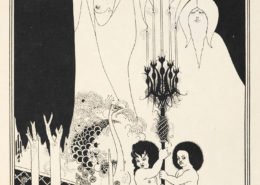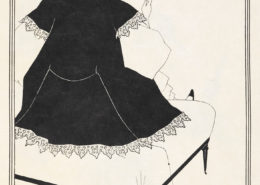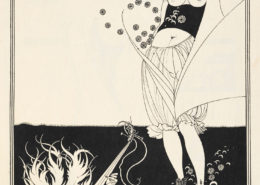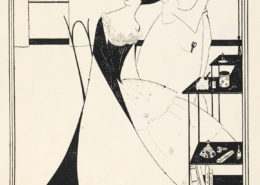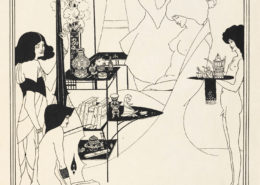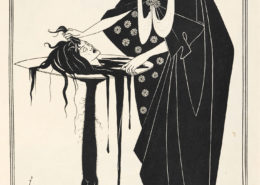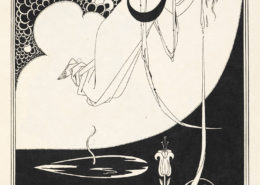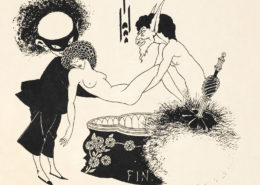Salome by Oscar Wilde
Title: Salome
Writer: Oscar Wilde
Form: Stageplay
First rehearsals: 1892 in London starring Sarah Bernhardt. Banned for depicting biblical characters on stage.
Published: in French in 1893. In English with illustrations by Aubrey Beardsley in 1894
First production: 1896, Paris
Wilde coined the title “Dance of the Seven Veils”
Reflections
Oscar Wilde’s play is the first incidence where Salome is independently responsible in her request for John the Baptiste’s (Iokanaan’s) murder. In retellings prior to this she is an agent of her mother’s political machinations.
This play sets up motivation for Salome’s choice to have Iokanaan killed: she feels oppressed by her stepfather’s predatory gaze, sees that Iokanaan holds high value to Herod, and understands that her femininity is her source of power to both entice and harm these men.
The narrative builds on several elements set out by Flaubert in the short story, Herodias. At his birthday party, King Herod is surrounded by philosophical men from a broad variety of cultural and faith traditions. They are all interested in the captured prophet, and would like to have him either freed or killed for various reasons. They also discuss the stories about a new prophet, Jesus, and debate the alleged details of his activities. Iokanaan’s language is cryptic at times and difficult to interpret, however he clearly slanders Herodias for her immoral behaviour. Herod does not protect his wife’s reputation; instead he dismisses her distress at the attacks.
At the beginning of Wilde’s stageplay, Salome comes up to the terrace for air – she is feeling suffocated by her stepfather’s gaze and by his loud, quarrelsome guests.
When her stepfather follows her, and with him his entourage, Queen Herodias says to King Herod, many times, that he must stop looking at Salome. This indicates that he must stare at Salome with inappropriate frequency. Salome would feel this predatory gaze and want to free herself from it.
Iokanaan’s prophesies herald the coming of a new king, which is the reason for Herodias’ political cautions in Flaubert’s story. In Wilde’s script, Herodias isn’t involved in the political discussion surrounding her; she is irritated by it. The primary harm of Iokanaan’s prophesies here is that they slander Herodias’ womanhood. When Iokanaan learns of Salome’s identity, he launches the same attacks against Salome.
Iokanaan accuses Herodias of “giving herself” to Chaldeans, Assyrians, Egyptians, and of incest for marrying her brother-in-law. When he learns of Salome’s identity, he demands she not look at him and keep her distance from his holy self.
Salome practices her power of seduction by flirting with a young Syrian, Narraboth, who holds the keys to release Iokanaan from his prison so that she can look at him. She knows of her stepfather’s fascination with the imprisoned prophet. She knows of her mother’s distress about the prophet’s opinion of her. She also knows that her own father had been imprisoned in the same cistern where Iokanaan is now held. All of this would lead her to want to see him firsthand.
Salome realizes quite quickly that her own womanhood has the power to repel Iokanaan and she would feel powerful in her ability to affect this seemingly powerful man who is clearly disdainful of her mother and of her – perhaps of all women.
Herod places greatest importance on the political and mystical conversation of the men around him. He keeps Iokanaan alive, despite the threat of another king’s approach, because he likes the mystical predictions and he likes to have domination over the Jews who want Iokanaan. He participates in the men’s conversation by trying to decipher the prophet’s riddled messages. He sometimes interprets them literally, and sometimes touches metaphorical meanings, although it is clear he’s in over his head amid the company he keeps.
Herod wants to consume his stepdaughter. He disregards his wife’s concerns, and doesn’t protect either of his women from Iokanaan’s attacks.
If femininity/womanhood is the locus of attack, it is the locus of the wound. And it becomes the weapon of revenge. Herod and Iokanaan fundamentally disdain women, without repentance.
Salome sees this and chooses to use her available weapon to harm both predators in the way that each man is most vulnerable.
She flirts with Iokanaan and laughs at his disgust with her. She then orders him murdered, which will silence his voice against herself and her mother.
She seduces Herod by leading him to believe she will yield to his lascivious requests, and then asking him to commit an act that he desperately opposes.
With her request for the murder of Iokanaan, Salome punishes both men and asserts her power over their weaknesses.
Herod’s last command to kill Salome indicates that no man whose pride has been so wounded knows how to live on with the perpetrator. Oscar Wilde knows this about masculinity, and understands that men’s retaliation when faced with their own weakness is to lash out yet again and more viciously. There is no way that Herod can take responsibility for his part in the activities that have unfolded, he must have all evidence exterminated.

